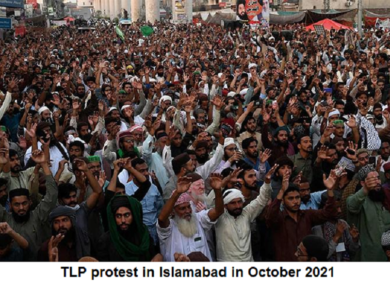
Pakistan-Saudi Rift Widens with OIC FM Summit
Pakistan hosted the 17th extraordinary session of the Organisation of Islamic Cooperation Council (OIC) of foreign ministers on the Afghanistan situation in Islamabad on December 19, 2021. The conference was attended by envoys from 57 Islamic nations and about 70 observer delegations from US, China, Russia, EU and the UN. Although, the purported objective of the gathering was to help salvage Afghanistan from humanitarian crisis, Pakistan tried to rake up unrelated issues, which Saudi Arabia did not endorse. While Saudi Arabia wanted to highlight the role and responsibility of Taliban 2.0 in restoring peace, stability and essential supplies in Afghanistan, Pakistan Prime Minister seemed inclined to blame the crisis on non-recognition of the Taliban regime and freezing of Afghan funds ($ 10 billion) deposited overseas.
The line taken by Pakistan was that the humanitarian situation in Afghanistan is worsening because the world has chosen not to recognise the Taliban government, despite the Saudis being circumspect on the matter. It was clear from the outset that Pakistan had motives to utilise the platform for its own agenda namely legitimisation of Taliban and its own strategic interests.
At the end of November 2021, the Kingdom of Saudi Arabia had proposed to host an OIC Extraordinary Summit to discuss the humanitarian situation in Afghanistan. So eager and desperate was Pakistan that it insisted to convene the Summit in Islamabad much to Riyadh’s surprise, despite its own economic and financial woes. The Saudi Press Agency reported (29 November 2021) that Saudi Arabia as the current chair of OIC had acknowledged Pakistan’s offer to host the Summit with the agenda to discuss the situation in Afghanistan and “pathways for an urgent humanitarian response”. The primary reason for Pakistan’s eagerness to host the OIC Summit was to reignite its waning ties with Saudi Arabia and also to rake up and highlight unrelated issues in front of the OIC members for its own strategic advantages. In the last few years, the Kingdom had become somewhat tepid and less responsive towards Islamabad, especially with regard to cooperation in terms of aid and oil.
Pakistan’s plan to push the recognition of the Taliban 2.0 regime as a legitimate government of Afghanistan in the OIC platform is clear from the Draft Declaration prepared by the Pakistan Foreign Office shared with the OIC headquarters. It had reportedly a line stating that unless the OIC recognizes the Taliban government the humanitarian crisis would worsen.
This, by the way, has been Pakistan’s standard line with the international community, the only difference now being that Islamabad wants the OIC to show direct solidarity with the Taliban. Additionally, Pakistan wanted to add a line in the declaration that the OIC had agreed to establish a Contact Group on Afghanistan, which the Saudi’s were against.
The closeness between Pakistan and the Taliban also became clear with its orchestrated moves with the Taliban before the summit. Just after Pakistan’s offer to convene the OIC summit in Islamabad, Taliban Chief Spokesman Zahidullah Mujahid stated (11 December 2021) that members of the OIC should recognize Taliban’s government at the Islamabad meeting. Pakistan had invited the Taliban to send its representative to the OIC extraordinary summit. TASS (17 December 2021) quoted Russian Special Envoy Zamir Kabulov as saying that it was possible that he might meet with the Taliban Foreign Minister Amir Khan Muttaqi in Islamabad on the sidelines of the OIC Summit.
The fundamental reason for Pakistan’s intense support for the Taliban stems from its deep state’s continued patronage of the Afghan Taliban, an organization that it has created, nurtured, armed and maintained over the years. (POREG)
-
CHINA DIGEST
-
 ChinaChina Digest
In China, Bragging About Your Wealth Can Get You Censored
ChinaChina Digest
In China, Bragging About Your Wealth Can Get You Censored
-
 ChinaChina Digest
China replaces Xinjiang party boss associated with Uyghur crackdown
ChinaChina Digest
China replaces Xinjiang party boss associated with Uyghur crackdown
-
 ChinaChina Digest
China’s Communist Party owns ‘intellectual property’ of Hong Kong democracy as its drafter and defender, think tank leader says
ChinaChina Digest
China’s Communist Party owns ‘intellectual property’ of Hong Kong democracy as its drafter and defender, think tank leader says
-
 ChinaChina Digest
Ultra-leftist voices are making themselves heard in China, but at what cost?
ChinaChina Digest
Ultra-leftist voices are making themselves heard in China, but at what cost?
-
-
SOUTH ASIAN DIGEST
-
 South Asian Digest
Panjshir Residents Protest Killing of “Innocent” Youth
South Asian Digest
Panjshir Residents Protest Killing of “Innocent” Youth
-
 South Asian Digest
PM Hasina returns home today
South Asian Digest
PM Hasina returns home today
-
 South Asian Digest
Nepal: As Maoists hold national convention, focus remains on managing leaders
South Asian Digest
Nepal: As Maoists hold national convention, focus remains on managing leaders
-
 South Asian Digest
No trips for Afghan women unless escorted by male relative: Taliban
South Asian Digest
No trips for Afghan women unless escorted by male relative: Taliban
-


Comments